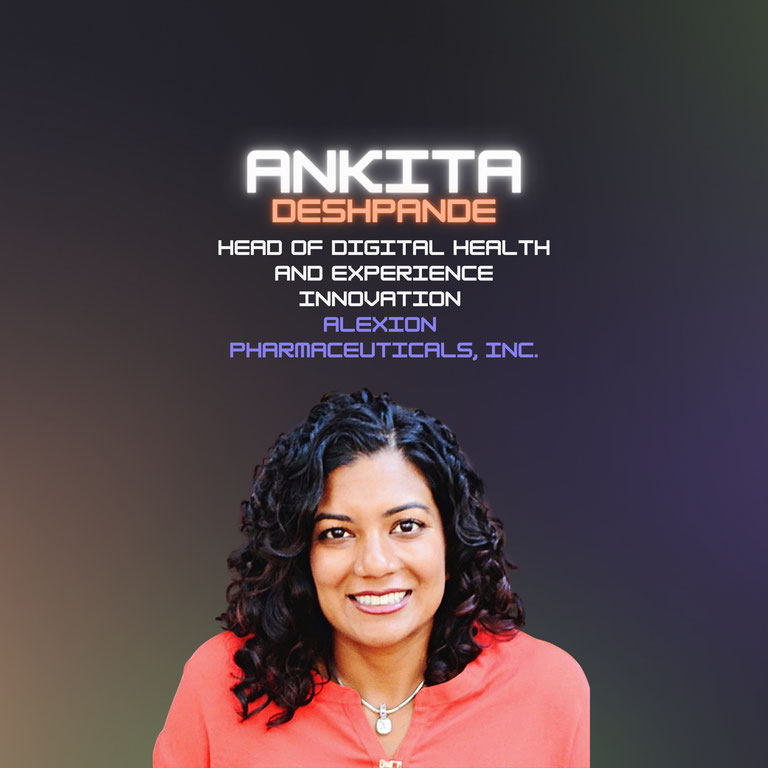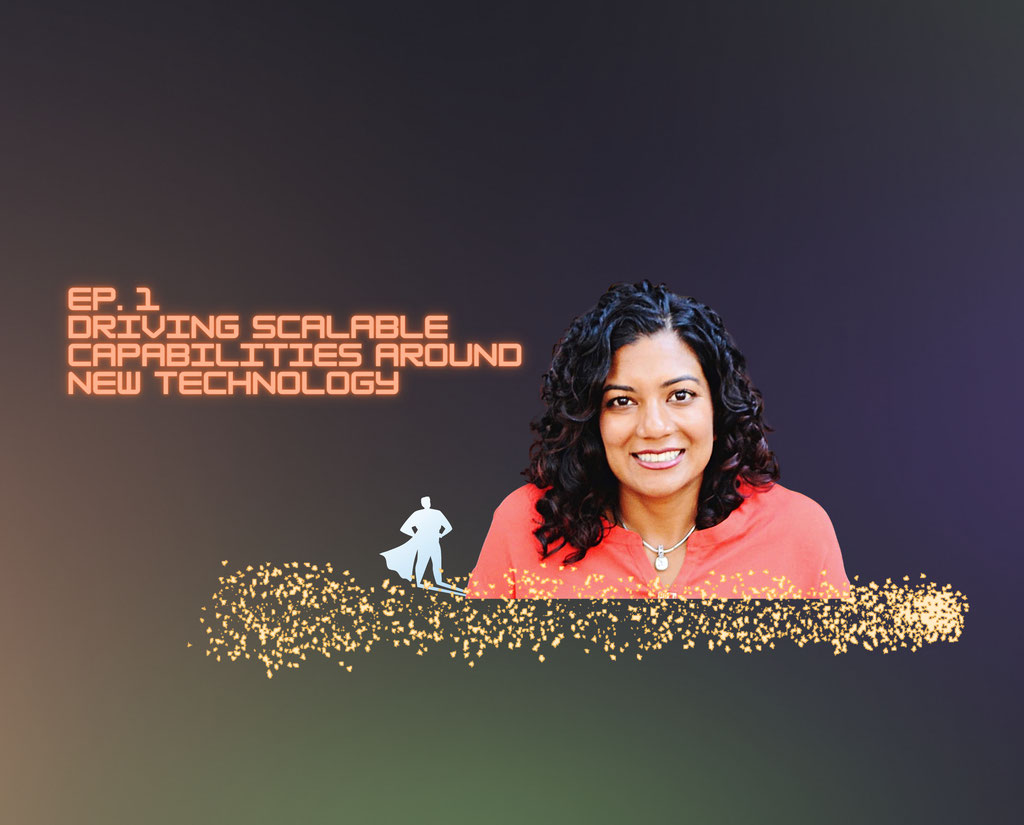
Innovation Heroes Season 3 - Episode 1
🔊 Podcast: This episode of Innovation Heroes demonstrates how evolving healthcare to meet the needs of future generations is no small feat! Ankita Deshpande is the Head of Digital Health and Experience Innovation at Alexion Pharmaceuticals, the rare disease business unit of AstraZeneca. Ankita and her team are leading the charge on improving the quality of life for people living with rare diseases through the development and delivery of innovative medicines and healthcare services. Adam and Ankita explore innovation, thought leadership, and making an impact in the pharmaceutical industry.
🔉 Click to listen 👇
Episode Highlights:
We've pulled out some highlight excerpts shared by Ankita in her interview - tune into the full episode for the full interview.
Alexion: The Basics
Alexion has been a really special place for everyone who has worked there, as well as the patients we serve. It's one of the first companies that really dedicated its mission to serving the rare disease community. That spirit of helping people who might not have other options or who appreciate having their voices elevated because they feel alone with their condition has been something that really drives all of us at Alexion every day.
What's really great about the culture we've developed is that we have really close connections to the individuals who may potentially benefit from the medicines we create. Families whose lives have been affected by rare diseases, individuals who have grown up with rare diseases--we've been able to see their progression through life, from being babies to being toddlers to being really active young adults. It's really heartwarming to see how their lives have been impacted.
Innovation at Alexion
You've got a whole part of the organization that's dedicated to clinical trials, to working those potential medicines through the different phases, generating a little more evidence each time. First, we know the medicines are safe, then we see some signals for efficacy, then we do a really big study, a phase three study, where we say yes, we can confirm that in this very large population, we see a really strong efficacy signal. Working backwards, you've got this whole section of the organization that's basically doing stage development. Start small, invest a little more, then invest a little more when you see signals.
Applying the Scientific Method to a Non-Scientific Problem: Innovation Methodology
When it comes to the development of new medicine, the pharmaceutical industry has been working through innovation methodology forever--we've probably defined the innovation methodology. Design thinking at its core is really just the scientific method applied to non-scientific problems. When you take a step back and you take yourself out of the medicine's development process and you think about how we operate and how we approach a particular challenge, those ideas haven't really evolved all that much in the past twenty to thirty years.
We still kind of take the same approaches, even though the medicines we develop are innovative. We're so innovative in the medicines we develop, but not necessarily in how we operate or the business models on the other end.
Innovation and Risk
Any time you try to innovate around how you do things, you introduce risk into what you're doing. The "what" that we're doing, at the end of the day, is life-saving, life-transforming, or really critical to people. How do you balance and make those trade-offs of doing it a different way, even though it might introduce more risk into the product development process? That's a really hard discussion to have. The roadblock that we tend to see is that, by definition, people are quite conservative and resistant to change.
Moving the Needle
We're not just trying to move the 90,000+ team at Alexion--we're also trying to move regulators, doctors, patients, and pharmacists--all at the same time. We've been exploring putting a QR code on a box of medicine where you search the leaflet that typically comes with the medicine--it pulls up an app where you can search it, and you can pull up videos.
What we learned is that the way the packaging has been designed--the paper is actually padding. When you take the paper out, you've lost an element of padding, so you have to reconfigure the entire manufacturing process. Not that it's not worth it, but one innovation has a ripple effect.
Isn't Innovation Everyone's Job?
I think there are different levels of innovation. There's efficiency innovation, which is making the things you do every day better, cheaper, more fun, and faster, which everyone should be doing. We should all be spending a little bit of time in our jobs figuring out how it can be more enjoyable, what we can get rid of, what we can automate--everyone should be innovative there.
On the other extreme, there is true disruptive innovation. I recently saw a job role for an ethical hacker--they're going in and trying to break all the codes and security. They're purposely trying to break the way we do things because that's how you identify what your future hurdles are going to be. You've got a whole team that's dedicated to breaking stuff and doing things in different ways so that when that disruption comes, you're ready. That, to me--no, everybody shouldn't be doing that. Most of your people should be operating the business, so you're future-ready.
Evolving to Meet the Needs of the Next Generation
The other is virtual engagement--thinking about VR, XR, AR, telemedicine, and how we're working with these new channels of engagement throughout our organization. I had a great conversation with some folks at a children's hospital. They did a study with some teenagers. They did a study where they had virtual engagement only, virtual and in-person, and in-person only. The two arms that had virtual did way better than the in-person engagement arm.
So it's an interesting thing to think about, when we think about people who are digital natives or metaverse natives--they're playing video games, they're living their lives through video games, they're really immersed in Oculus, they're going to grow up and be adults. How do we evolve to think about that population and engage them?
Collecting IoT Data
We're looking at person-generated digital health data. Think about the internet of things that we interact with. How can we collect that data to help healthcare overall, with a broad view? Sometimes we could be looking at certain signals to diagnose someone with a disease, or maybe you're monitoring someone remotely, or maybe you're trying to help them with their wellness overall.
There's so many ways you can use that data, and there's so much of it out there. I usually thought about it like oh, it's your phone or your watch--but there are smart fridges now that tell you what's in your fridge. That's so cool. Think about how much you could do if you had smart fridge data.
Within the rare disease community, there are so few patients. They're spread out everywhere, so accessing healthcare can often be hard. Many patients will drive six hours or more to see a specialist for their disease. That's challenging. That's a whole lot of time. If you're a parent, it's time off of work, or time off of school, it might mean packing up a whole family and taking time away from other kids. When you add it up, there's a need to figure out how to use big data to support small human populations.
Thought Leadership: Deshpande's Perspective
I kind of think of thought leadership as two buckets. The first is communicating the knowledge you've gained. You think back to the scientific research teams in big pharma companies, they're constantly publishing. They're doing a set of experiments, they're analyzing data together, they're putting it into a cohesive narrative and that goes into a peer-reviewed journal that's available to the world. Through that, they're creating knowledge capital. It's not revenue to the company, but it's a different form of value.
Outside of the science world, you don't see that kind of publication mentality. To share what we've learned, whether that's internally or externally, I think that's important too. That's how we create knowledge capital with the work that we're doing.
Final Thoughts
We're so glad Deshpande took the time to sit down with us at HeroX to talk about what it means to be an innovator in the healthcare industry, and we hope that we get the chance to collaborate again in the future. This episode made us excited about the positivity and innovation happening at Alexion, and we're excited to follow Deshpande as she continues to make a positive impact in the pharmaceutical industry.
Thank you for checking out Season 3: Episode #1 of the Innovation Heroes series!
Let's keep the conversation going! Interested in chatting with Adam on an Innovation Heroes segment or recommending a guest? To join the queue, send an email to Attn: Adam. Include your name, email, and topic of interest (you can also use the HeroX contact form).
 Keep your sights on this powerful futurist as she continues to redefine the way we develop and deliver innovative medicines and healthcare services.
Keep your sights on this powerful futurist as she continues to redefine the way we develop and deliver innovative medicines and healthcare services.
About Ankita Deshpande | Connect
Ankita is a Futurist dedicated to applying innovative methodologies in the creation of the next generation of total healthcare solutions.
Connect with Ankita: LinkedIn
🔉 About the Innovation Heroes podcast
The Innovation Heroes series covers all things open innovation, crowdsourcing, and remote work. It’s time to open up the airways, share strategies, engage partners, and leverage the power of crowd intelligence to expedite solutions to the pressing problems facing every level of organization, individuals, and the world. The key word here is OPEN.
We're bringing our partners in innovation, organizations who have run their own crowdsourcing projects, innovator powerhouses, and remote work legends into the spotlight. There is a global network ready to contribute time, energy and intelligence to just about any challenge that comes their way. All we need to do is provide the opportunity. Thank you for being a part of the solution. Discover the Power of the Crowd
About Adam Olsen | Connect
Adam is your Podcast Host and Possibilities Manager at HeroX, connecting with innovation leaders from around the world to gain insights on how they approach innovation, the technologies they're most excited about, and how these innovations impact their industries.
HeroX is a platform and open marketplace for crowdsourcing innovation that allows anyone, anywhere, to solve everyday business and world challenges using the power of the crowd.
Connect with Adam: LinkedIn,








